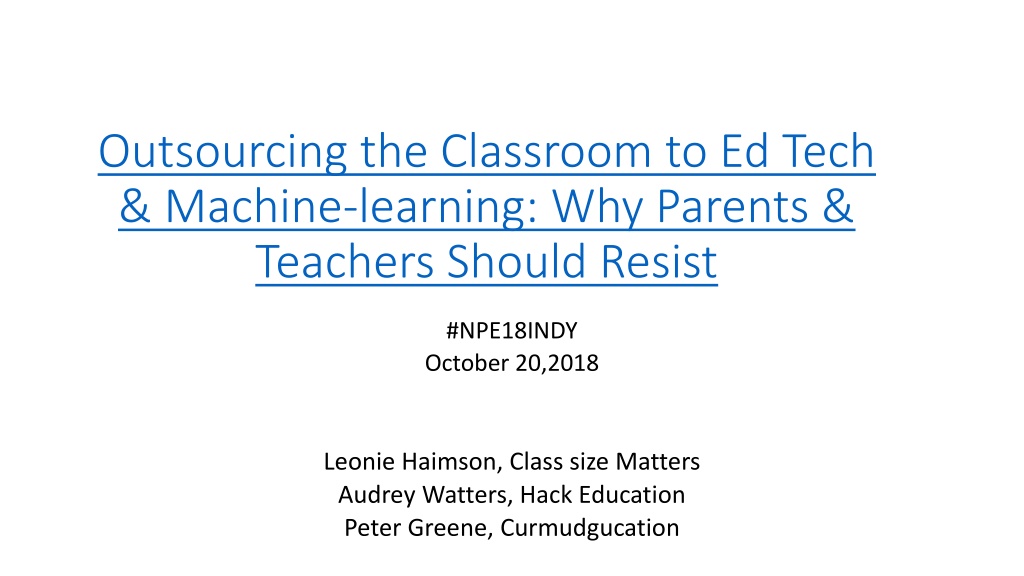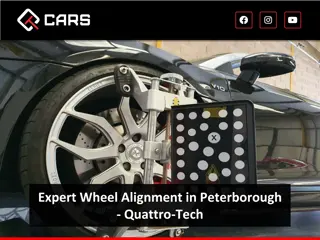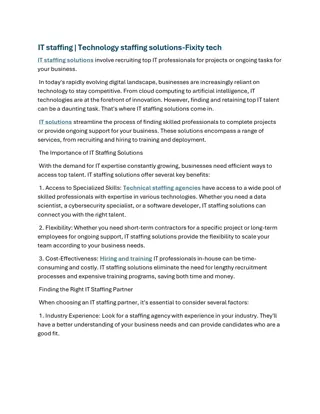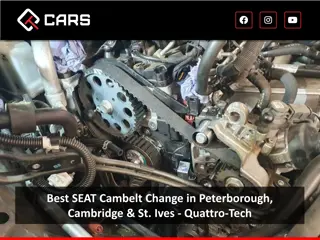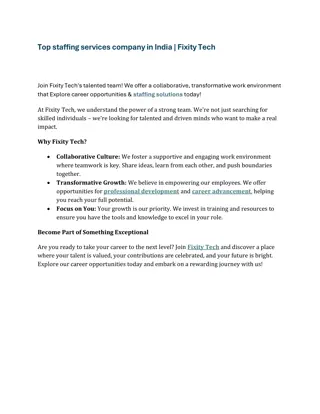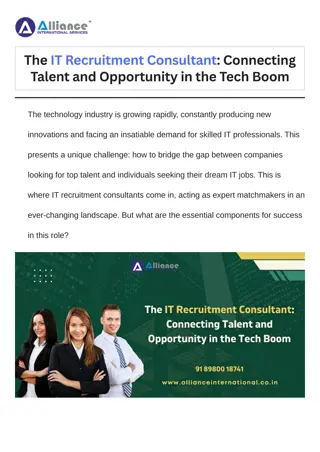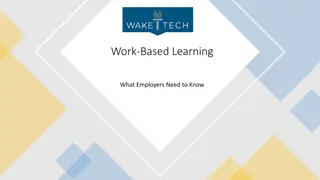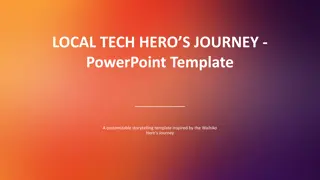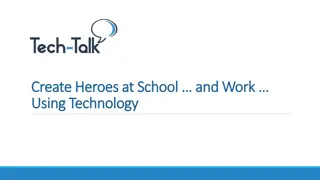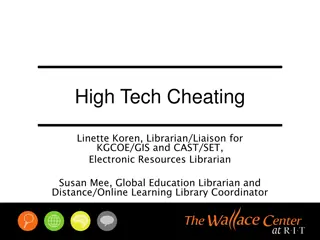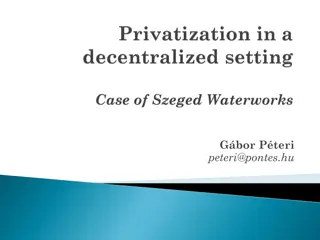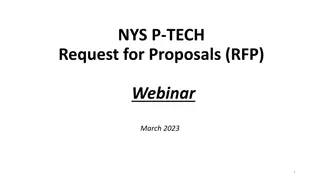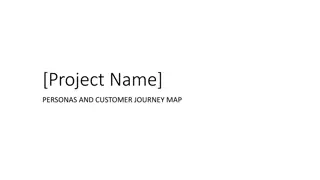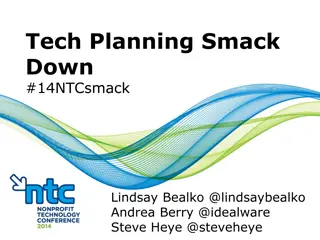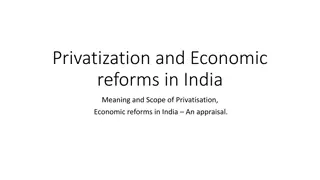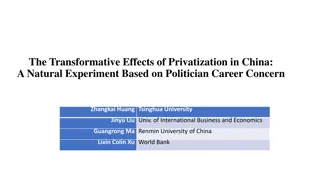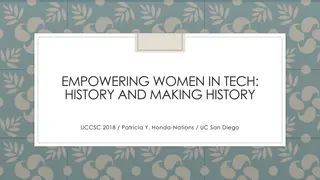Examining the Impact of Ed Tech and Privatization on Education
Exploring the implications of outsourcing the classroom to educational technology and the privatization of schools, this piece delves into the concerns raised by educators and parents. It discusses the various forms of privatization happening in education, the loss of teaching jobs, the influence of figures like Bill Gates, and the limitations of a data-driven approach to learning.
Download Presentation

Please find below an Image/Link to download the presentation.
The content on the website is provided AS IS for your information and personal use only. It may not be sold, licensed, or shared on other websites without obtaining consent from the author. Download presentation by click this link. If you encounter any issues during the download, it is possible that the publisher has removed the file from their server.
E N D
Presentation Transcript
Outsourcing the Classroom to Ed Tech & Machine-learning: Why Parents & Teachers Should Resist #NPE18INDY October 20,2018 Leonie Haimson, Class size Matters Audrey Watters, Hack Education Peter Greene, Curmudgucation
Privatization comes in many forms all of them happening now More privately run but publicly funded charter schools Expansion of vouchers and tax credits going to fund private & religious schools Proliferation of online learning, in which instruction, assessment and behavior management outsourced into hands of private vendors.
Sometimes different forms of privatization happen together . Rocketship charters uses Dreambox software, co-owned by Rocketship John Danner and Netflix founder Reid Hastings
Since 2009, theres been a loss of teaching jobs - now a gap of nearly 400K leading to class size increases
Gates pushed standardizing education and making it more efficient through Common Core, inBloom and proliferation of ed tech tools Gates-funded $100M data collection project called inBloom -- only part of much larger effort to mechanize education Every student would have personal data collected over time while plugged into online curriculum with every component tagged with a specific Common Core standard Gates spent over $500M on Common Core not because standards were better, or more rigorous but b/c standardizing them nationwide would allow for a uniform outlet that every kid and every curriculum could be plugged into If you have 50 different plug types, appliances wouldn t be available and would be very expensive. But once an electric outlet becomes standardized, many companies can design appliances and competition ensues, creating variety and better prices for consumers, he said.
Yet this Rube Goldberg concept of education doesnt work! Larry Berger, head of Amplify, who came up with idea for inBloom said I spent a decade believing in this model the map, the measure, and the library, all powered by big data algorithms. Here s the problem: The map doesn t exist, the measurement is impossible, and we have, collectively, built only 5% of the library. Not only is the human mind too complex but learning best takes place in a social context. Students learn best from interacting with teacher and their peers.
Only real way to personalize learning is to reduce class size, yet elected officials, private industry and venture philanthropists have promoted instruction through machines instead Called virtual learning , blended learning or personalized learning all basically meaning same: substituting human interaction with teachers or fellow students with time spent on computers for part or most of the school day After great recession, Bill Gates, Arne Duncan & others advised districts to take advantage of budget shortfalls by increasing class size Teachers are too expensive and can be unruly; instead they claimed education was an engineering problem with a engineering solution.
Global investment in ed tech has risen steadily Source: "The 2017 Global Learning Technology Investment Patterns." Metaari Advanced Learning Technology Research.
Government and industry support US ED provided half billion dollars to fund expansion of online learning under Ed Sec Arne Duncan & created Future Ready pledge signed onto by more than 3100 Superintendents Betsy Devos supports online education & invested in K12 Inc. company selling coursework to online charter schools & home- schooling parents. She still holds stocks in Neurocore brain training company touted as helping kids w/disabilities Mark Zuckerberg is spending hundreds of millions on ed tech via his for-profit LLC Chan Zuckerberg Initiative, including on Summit personalized learning platform. Just announced: Summit PLP will spin off into new corporation with board of directors including his wife, Amy Chan and the CZI CFO, who will help guide it to sustainability.
Duncan and Gates created Future Ready Schools Future Ready Schools districts work with necessary stakeholders to ensure that all students and educators across the district have regular access to devices for learning. More than 3000 district Superintendents have taken Future ready pledge to transition to digital learning How much time will it take for the district to complete the transition to digital learning? The truthful answer to this question is that a district will probably never be finished.
Organizations & companies working w/ Future Ready to promote online learning
Hype around online programs far transcends any evidence of effectiveness Little or no evidence to prove their effectiveness; and when there is negative evidence its suppressed Foundations, the advocacy groups they fund, media and ed tech industry all collaborate in a huge PR effort Only 11% of district/school officials in charge of purchasing ed tech say they insist on any independent peer-reviewed research before buying a product.
Each new faddish digital program massively promoted until reality Each new faddish digital program massively promoted until reality sets in sets in NY Times called 2012 Year of the MOOC ; two years later explained why it hadn t worked for most students
Rupert Murdoch was bullish on ed tech When it comes to K 12 education, we see a $500 billion sector in the U.S. alone that is waiting desperately to be transformed by big breakthroughs," he said in 2009. He bought Wireless Generation in 2010, renamed it Amplify, and put Joel Klein in charge Joel Klein said Amplify Tablet is going to transform the way teachers teach and students learn
What Happened? until one month into the Within a month of its introduction in Guilford NC schools, 1500 screens broke and batteries melted in 75 more
In 2015 Murdoch ends up selling Amplify at a loss of over $400 M
Alt School, a blended learning private school chain of 8 schools Alt School, a blended learning private school chain of 8 schools founded by a founded by a former Google executive former Google executive with over $100M from investors like investors like Mark Zuckerberg Mark Zuckerberg with over $100M from
Weve literally built an operating system for a 21st century school system, founder Max Ventilli said in 2015. Profiled in Wired, New Yorker, Public Radio in 2015-2016. Though the company touts the magic of its technology, two parents said their children benefited more from the extensive attention of talented teachers and small class sizes. By 2017, Ventilli closed four of his schools and said instead he would focus on instead on selling his technology to other schools .
Summit p Summit charter schools based in CA introduced an online platform in 2010 to deliver curriculum and instruction with funding from $1M + from Gates Online Personalized Learning Platform Summit partnered with Facebook in 2014 and now subsidized and engineered by Chan-Zuckerberg Initiative LLC Students assigned "playlists" of online curriculum & assessments to complete on their own & at their own pace Initially parents had right to consent for Summit to collect & disclose their children s data but after CZI involved, that right was eliminated This year, Summit PLP expanded to more than 300 schools across the country, both charter and public
Summit collects voluminous student data & Summit collects voluminous student data & shares w/ up to 18 corporate partners including CZI shares w/ up to 18 corporate partners including CZI Contact information: name, email, username & passwords; Attendance & disciplinary records including suspensions & expulsions Race, ethnicity & economic status Student work in video, audio, text & course progress; Test scores, grades & standardized test results; Grade level promotion, HS graduation, SAT scores, college acceptance & attendance& employment. Academic or extracurricular activities a student may belong to or participate in.
Parent and student discontent at many schools using Summit PLP Parent and student discontent at many schools using Summit PLP Students don t get enough personal feedback from teachers; suggested 15 min per week from mentors but sometimes less Parents say their kids are bored & begin to hate school, fall behind on their assignments Some parents have pulled their kids out of school, moved to another district or homeschooling No idea how disengaged this program would have my daughter from school . She has always been an easy kid that enjoys school. This year? she doesn t want to go. It s booorrriiinnnggg. She needs that teacher engagement to hold her attention. Computer screen doesn t cut it. Within weeks my son started coming home from school upset and didn t want to go to school. He said that he didn t like being taught by a computer and sitting in front of a computer watching videos and taking notes all day. He was basically in charge of his own education at the age of 12.
Yet evidence for Summit and online learning weak CREDO study shows students in full-time online charter schools fell behind peers, with 180 fewer days of learning in math and 72 fewer days in reading. Gains in math were so small, it was "literally as though the student did not go to school for the entire year According to a CREDO 2017 analysis , Summit charter students showed no significant gains in and a small but significantly negative effect in math RAND researcher, John F. Pane, has said the evidence for personalized learning is still very weak.
2017 RAND study Examined more select group of 32 Personalized Learning schools w/ Next Generation Learning Challenge grants from Gates etc. including Summit Gains on tests tiny; 0.09 SD in math & 0.07 in reading; only math significant. 71% students say that they are bored vs 58% of national sample
Students at NGLC schools were less likely to feel safe Less likely to say there is one adult at school who knows them well Less likely to feel an important part of their school community Pane, John F., et. al. Informing Progress: Insights on Personalized Learning Implementation and Effects. RAND Corporation, July 2017.
Huge threat to student privacy as data outsourced into hands of corporations FERPA was weakened twice- under Bush and Obama to allow for expanded disclosure to corporations & organizations w/o parental consent Future of Privacy funded by ed tech industry and Gates etc. created a voluntary student privacy pledge that many companies have signed but is not enforceable College Board signed pledge though they sell student data and allow it to be used for marketing purposes; Facebook (and CZI ) signed pledge though FB has repeatedly violated privacy, triggering legal complaints but no action by the FTC Data breaches have multiplied hugely and many of the most-used apps use data for advertising purposes EdModo- acquired by a Chinese company has done both.
Nevertheless online learning continues to thrive More big data used to create black box algorithms to direct adaptive learning, that can reinforce biases More surveillance of students and teachers More robots used in place of teachers
Now theres a push to use Amazon Echo & other internet connected devices in schools
Headbands to measure and report student EEGs to teacher dashboard to oversee their attention levels. Developed at Harvard Innovation Labs, company has received $15 million in venture funding from Chinese investors
Recalls 1910 illustration by Recalls 1910 illustration by Villemard Villemard, imagining schools , imagining schools In the Year 2000 In the Year 2000 https://www.urbanghostsmedia.com
PreK students not exempt from online learning UPSTART online preK used in 6 states and by 30% of 4 year old students in Utah
Even Finland is piloting robot teachers in Even Finland is piloting robot teachers in classrooms classrooms
So what can parents/teachers do to push back? Organize, organize, organize in your school, district or state. Parents in all nine states/districts beat inBloom despite NO funds and little support from mainstream privacy advocacy groups Over 250 NEW state student privacy laws passed since 2014 as a result of the ensuing controversy. Parent Cindy Eckard of Screens and Kids advocated for new MD law HB1110, requiring MD Departments of Education & Health to draft health and safety best practices for use of technology in classrooms. Remember: Online learning is a vast, unregulated experiment; and no generation of children has ever been exposed to this much computer screen time at home or at school.
